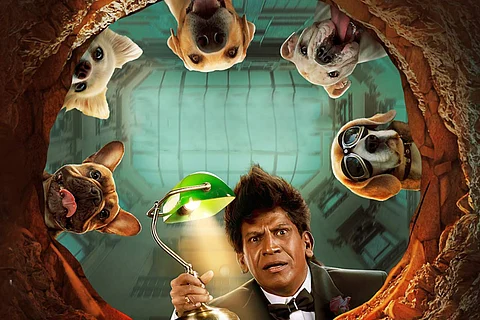

"Naam yaaruku enna theengu seidhom?” I muse, ten minutes into the much-awaited Naai Sekar Returns. The title makes a call back to Vadivelu’s character in Thalai Nagaram (2006) in which he plays a laughably over-the-top rowdy called Naai Sekar. I wish I could write this review for ‘Vaigai Puyal’ Vadivelu’s return to the big screen entirely in his own iconic dialogues. The line from Imsai Arasan 23 Pulikesi (2006), the actor’s historical satire, remains a meme-favourite as much as the film continues to hold on to its legendary status. But that dialogue also has a life and emotion of its own. Every Tamil who has grown up on Vadivelu’s comedy understands the wry pity the dialogue implies for one’s self when caught in less-than-ideal circumstances. To translate his dialogues may sound meaningless in English without a larger explainer. But so firmly is the actor and his work embedded into Tamil popular culture that audiences have spawned countless gifs, memes, Instagram reels, and WhatsApp stickers based on it. They serve as a cipher for an entire generation of Tamils: you either know its meaning or you don’t.
This is why Naai Sekar Returns is more of a tragedy than the comic film it was intended to be.
Suraj, who directed Thalai Nagaram, seems to have hoped that mere callbacks to Vadivelu’s illustrious career and the actor’s reappearance would be enough to make Naai Sekar Returns work. It doesn’t. The jokes fall flat. Vadivelu adopts all his trademark mannerisms, but they feel like a caricature of himself. His comic flair is sorely missed – even more so when the film makes passing references to some of his most popular roles like Contractor Nesamani, Kaipullai, and Vandumurugan.
Naai Sekar in this film, for reasons known only to the director, is born as a boon granted at a Bhairava temple. An unimpressive flashback tells us so, adding that at the same time a poor, wandering, sage gifts his parents an “auspicious” husky puppy to bring them good fortune. The puppy’s mere presence makes the family fabulously wealthy. Why this old godman goes around the countryside with a magic pedigree dog in a basket is also only known to the director. As soon as his mother reaches home, she has morning sickness and throws up. The grandmother takes the woman’s pulse, and the woman is immediately declared pregnant. Similar sequences have played out in more films than we can count in the 90s and none of us batted an eyelid, but this is thirty years hence. Can Kollywood please give us an update on this pulse-pregnancy test?
The rest of the film is about how Naai Sekar grows up to be “India’s first dog-kidnapper”, how the magic husky was stolen from his family in his childhood, costing them their wealth, and the attempt to reunite with this auspicious animal. Other comedians including Anandraj, Manobala, Sivaangi Krishnakumar, and Redin Kinglsey come and go. Except for Anandraj, who plays one of the antagonists – a rival rowdy called Dass, the rest of the cast is painfully unfunny. Not that, that stops them from trying. The jokes, or attempts at them, are relentless. The kind that makes you bleakly wonder why you risked reviewing this film while a cyclone is heading toward your city. “Neenga aaniye pudunga venaam”, my mind-voice grumbled, channeling my inner Contractor Nesamani.
Actually, the entire premise of Naai Sekar Returns is three decades too old. Maybe itinerant sages and enchanted gifts would have worked as origin stories in the 90s. In 2022, agonised, clutching my head in the theatre, I echo one of Vadivelu’s own dialogues: “sothikaathinga da, sothikaathinga.”
The film may have been marginally less underwhelming if only director Suraj hadn’t tried to infuse pathos through the magical husky. Parachuted into a slapstick comedy out of nowhere, the pathos doesn’t stick. The film, already labouring under the weight of its flat jokes, completely collapses when it introduces its second antagonist, Max (Rao Ramesh). Naai Sekar has to outwit Max to regain the husky. Max’s cartoonish villainy neither draws laughs nor is he a convincing root for any contrived pathos the film attempts.
For fans of Vadivelu, including this reviewer, the film lacks all the luster it promised. The actor will be seen next year in Mari Selvaraj’s Maamannan. The Karnan and Pariyerum Perumal director may almost certainly tap into a lesser-seen side of Vadivelu—his ability to also pull off serious, deeply emotional roles. It would have been a far more fitting comeback for a star, so inseparable from Tamil movie culture, than Naai Sekar Returns.